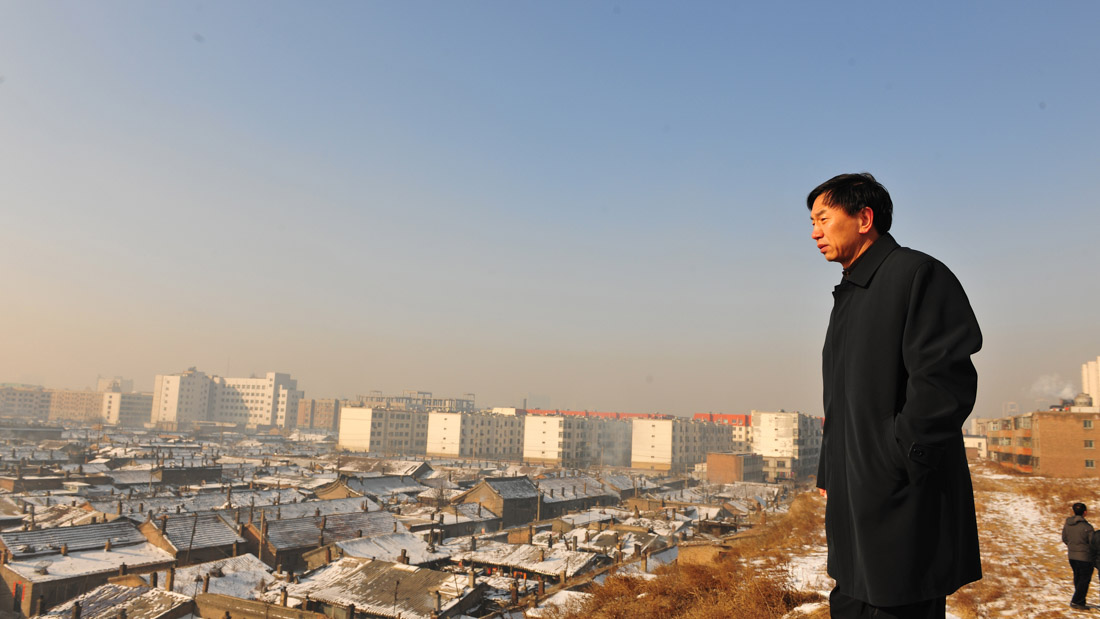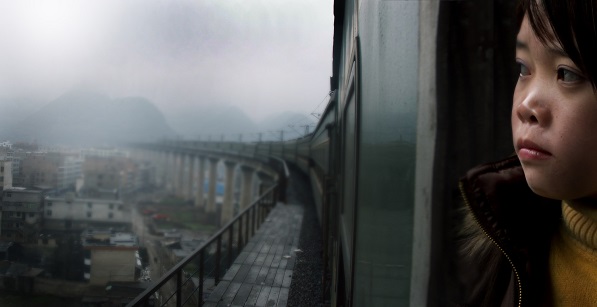Here’s a question for your next movie trivia night: how many filmmakers have had their last four features premiere at Sundance? At least one person fits the description: producer/director Zhao Qi. He may not be as renowned among Chinese filmmakers as Zhang Yimou or Jia Zhangke, but in just the last several years he has emerged as a key figure in Chinese documentary, succeeding at a critical period when independent documentary in China has fallen into great distress.
According to research by Genevieve Carmel, a writer and programmer of Chinese films, in the past six years only four documentary features from China have premiered at Sundance. All four of those films—the smash hit Last Train Home (2010); China Heavyweight (2012); Fallen City (2013); and this year’s award-winner The Chinese Mayor (2015) were produced by Zhao Qi. Zhao also directed Fallen City, which, like Last Train Home and China Heavyweight, enjoyed national broadcast distribution on PBS. One might say that no other Chinese filmmaker has navigated the U.S. festival and distribution gauntlet, from Sundance to public television, as successfully as Zhao, in order to deliver his vision of China to a broad American audience.
What exactly is that vision, and how come it works in the U.S. distribution scheme? Zhao’s productions are highly topical, dealing critically with such issues as migration (Last Train Home), the sports industry (China Heavyweight), natural disaster (Fallen City) and provincial politics (The Chinese Mayor). The strong subject matter is enhanced by compelling central characters, professional production values and audience-friendly narrative and pacing. In many ways these films fit the checklist of what Sundance and PBS programmers are looking for.
But for those same reasons, critics like Genevieve Carmel express skepticism over whether these criteria are too much of an imposition on what has made Chinese independent documentary so distinctive over the years. In her account, Carmel lauds Chinese indie docs as a vital reaction to the pre-scripted, propagandistic versions of reality issued by the Chinese state media. “Chinese independent filmmakers have developed their own unique values for documentary, in reaction to the older, more prescriptive rules that continue to govern television docs.” Applying this argument to the Sundance/PBS context, one might wonder if these U.S. institutions are not imposing their own pre-scripted formulas that limit the versions of reality—Chinese or otherwise—that are accessible to audiences.

Speaking personally, I have borne such misgivings in the past, lauding documentaries from China that I considered to be the most uncompromising and fiercely committed to free expression and truthfulness. Among these, my favorites are: Li Ning‘s Tape; Huang Weikai‘s Disorder; Wang Bing’s West of the Tracks; Zhao Liang’s Petition; and Xu Xin‘s Karamay.
Most of these titles came forth between 2008-2010, a period which, in retrospect, may be considered the high-water mark for independent documentary in China. But every year since has amounted to the tightening of the vice of censorship and disruption of independent film production and exhibition, with the harassment of filmmakers and shutting down of independent film festivals effectively stifling the atmosphere for free creative expression and sharing.
Thinking back on the past few years, I feel a great sense of loss and sadness over what was and what became of one of the most extraordinary boom periods of any point in the history of world documentary as well as Chinese cinema. Independent documentary still exists, though more than ever in the margins and seeking outlets wherever they may be. To that end, Geneveive Carmel has formed a programming initiative with Benny Shaffer and Zhou Xin named Crows and Sparrows, that seeks to form an exchange between Chinese independent filmmakers and the U.S.
At the same time, I have a new found respect for filmmakers like Zhao Qi who have managed to bring the spirit of independent filmmaking into the mainstream. Zhao, a veteran of the Chinese state media network China Central Television, knows his way around the established systems of production and distribution, but he also seeks to bring a more progressive energy into the status quo. In this regard, his latest production, The Chinese Mayor, may be his greatest achievement to date. Directed by Zhou Hao, a veteran of investigative documentary, this film deals critically with a massive urban renewal program in the major Chinese city of Datong, displacing thousands of residents in order to create a more attractive cityscape to promote tourism. What is stunning is the degree of access the filmmakers gain to the upper echelons of the local government, enticing a prominent city mayor to tell his story while effectively juxtaposing it against those he is dispossessing.

But for Zhao, the access is just a means by which to deliver a deeper, more powerful and complex impression of what China is like, regardless of the degree of the viewer’s familiarity with the country and its manifold social and cultural issues. Zhao says:
“It’s not only the access, which is wonderful; we also try to deliver a more complicated message through this access… We deliver messages that are challenging to [the audience’s] pre-existing knowledge about China. We try to show something that they haven’t thought about before. So it’s new information, a new perspective, they’re going to get from watching this film. So I guess that’s the most interesting part. They’re going to get a new China from the film.”
This new vision of China is what the best documentaries, independent or otherwise, seek to deliver.
Kevin B. Lee is a filmmaker, critic, video essayist and founding editor of Keyframe. His video essay Transformers: The Premake will screen at the 2015 International Film Festival Rotterdam and the Berlinale International Film Festival Critics’ Week. He tweets at@alsolikelife.




